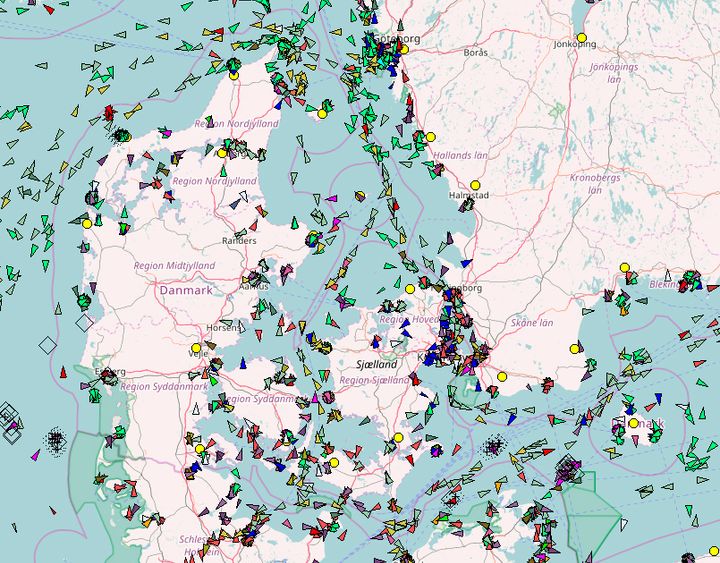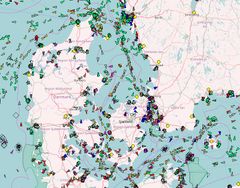
DMA opens up for more historical Danish AIS data

The Danish Maritime Authority has previously published historical Danish AIS data covering the period 2014-2016 on its website, and now we open up for even more historical data as data from 2006 to 2014 are made available. The historical data are a supplement to the current solution with access to live AIS data.
All files are available for free from the Danish Maritime Authority's website:
http://www.dma.dk/SikkerhedTilSoes/Sejladsinformation/AIS/Sider/default.aspx
These historical AIS data will be available for the next six months and, subsequently, they will be removed from the website. The data quantity is very comprehensive and will require large storage capacity if data are to be available for ever.
In the future, it will be possible to retrieve AIS data for the recent two running years. These AIS data are also available from the website of the Danish Maritime Authority:
http://www.dma.dk/SikkerhedTilSoes/Sejladsinformation/AIS/Sider/default.aspx
Deputy Director General Troels Blicher Danielsen from the Danish Maritime Authority:
”Now that we open up for even more historical AIS data, it is our hope that Blue Denmark can use these AIS data to make analyses, services or new products.”
Data can be used for analyses
AIS data are stored as so-called CSV files. In order to use the historical AIS data, you need a special application capable of processing and converting data into a user-friendly presentation.
Historical data can be used for, for example, analyses of navigational patterns, etc.
The Danish Maritime Authority no longer makes analyses, etc. for external users. For this purpose, reference is made to private players in the market.
Facts
An annual fee is requested for access to live AIS data.
AIS is short for Automatic Identification System. AIS is a VHF-based navigation and anti-collision tool making it possible to exchange ship-to-ship information. This information – AIS data – is furthermore collected in a shore-based AIS system that is operated by the Danish Maritime Authority.
On the following ships, an AIS transponder is a carriage requirement:
- All ships above 300 gross tonnes
- All passenger ships
- All fishing vessels with a length above 15 metres.
Smaller vessels can be fitted with class B AIS equipment – but it is not a requirement.
Contact person
Troels Blicher Danielsen, Deputy Director General of the Danish Maritime Authority, +45 72 19 62 04
Nøgleord
Billeder
Information om Danish Maritime Authority
“The Danish Maritime Authority sets the direction for future quality shipping”
Our field of responsibility is based on the shipping industry and its framework conditions, the ship and its crew. In addition, we are responsible for aids to navigation in the waters surrounding Denmark and ashore. In other words, the Danish Maritime Authority has the responsibility for the following:
- The construction, equipment and operation of Danish ships (including safety, terror prevention, navigational regulations, manning, occupational health and environmental protection) as well as port State control of foreign ships calling at Danish ports.
- Ship registration.
- Seafarers’ employment, health and conditions of social security.
- Shipping policy, maritime law as well as industrial policy, both nationally and internationally.
- Tasks related to aids to navigation at sea and ashore (lighthouses and buoys), including ships and repair workshops.
- Navigational information in the form of navigational analyses, warnings, GIS and specialist publications.
- The national pilot authority.
The Danish Maritime Authority consists of the central authority, eight survey offices, including the office in Nuuk, Greenland, as well as the Centre of Maritime Health and Safety on the island of Fanø.
Our responsibility as a government agency applies both to the merchant fleet and the fishing industry. However, the Danish Maritime Authority is not responsible for the industrial policy relating to fishing which is under the auspices of the Ministry of Food, Agriculture and Fisheries.
Please observe that the surveillance of Danish waters and of civilian shipping, sovereignty enforcement, the police authority, pollution prevention, environmental surveillance, ice-breaking, etc. are the responsibility of the Ministry of Defence.
The Danish Maritime Authority is a government agency under the Ministry of Business and Growth.
Følg pressemeddelelser fra Danish Maritime Authority
Skriv dig op her, og modtag pressemeddelelser på e-mail. Indtast din e-mail, klik på abonner, og følg instruktionerne i den udsendte e-mail.
Flere pressemeddelelser fra Danish Maritime Authority
Modernization of Danish Shipping routes1.7.2020 13:50:33 CEST | Press release
As of 1 July 2020 new shipping routes in Kattegat and Skagerrak will be implemented. At the same time, digital solutions will be deployed with the use of virtual buoys.
Day of the Seafarer dedicated to the role of women in shipping25.6.2019 11:54:25 CEST | Pressemeddelelse
Each year the International Maritime Organization (IMO) celebrates the seafarers with a campaign that focuses on the importance of seafarers' work for the benefit of the whole world in a sector that accounts for approx. 90% of the world's transported goods
Personal watercraft certificate24.4.2019 13:47:05 CEST | Press release
You must have a personal watercraft certificate to use a personal watercraft or similar vessel. Watercraft certificates are a requirement, whether you own or rent the vessel.
Remember to apply for a refund of the ship registration fee6.7.2018 13:01:19 CEST | Pressemeddelelse
As of January 1, 2018, vessels registered in the Danish ship registries no longer have to pay registration fees. If you have paid registration fees between January 1, 2018 and April 30, 2018, you can therefore get a refund.
Dane receives the IMO International Maritime Prize5.7.2018 08:53:35 CEST | Pressemeddelelse
Former Deputy Director General of the Danish Maritime Authority, Mrs. Birgit Sølling Olsen, is set to receive the 2017 International Maritime Prize. This was decided yesterday on July 4th by the governing body of the International Maritime Organization, the IMO Council, which was convened this week in London.

 Danish Maritime Authority
Danish Maritime Authority